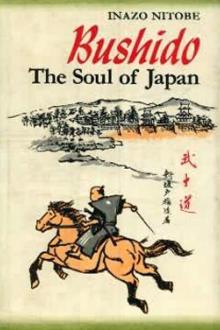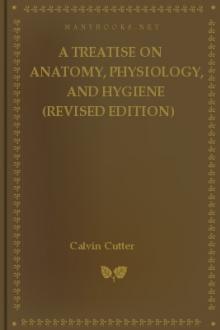Bushido by Inazo Nitobe (best ebook reader for surface pro .txt) 📖

- Author: Inazo Nitobe
- Performer: -
Book online «Bushido by Inazo Nitobe (best ebook reader for surface pro .txt) 📖». Author Inazo Nitobe
The Project Gutenberg EBook of Bushido, the Soul of Japan, by Inazo Nitobé
This eBook is for the use of anyone anywhere at no cost and with
almost no restrictions whatsoever. You may copy it, give it away or
re-use it under the terms of the Project Gutenberg License included
with this eBook or online at www.gutenberg.net
Title: Bushido, the Soul of Japan
Author: Inazo Nitobé
Release Date: April 21, 2004 [EBook #12096]
Language: English
Character set encoding: ISO-8859-1
*** START OF THIS PROJECT GUTENBERG EBOOK BUSHIDO, THE SOUL OF JAPAN ***
Produced by Paul Murray, Andrea Ball, the Online Distributed
Proofreading Team and the Million Book Project/State Central Library,
Hyderabad
BUSHIDO THE SOUL OF JAPAN BYINAZO NITOBÉ, A.M., Ph.D.
Author’s Edition, Revised and Enlarged
13th EDITION
1908
DECEMBER, 1904
TO MY BELOVED UNCLE TOKITOSHI OTAWHO TAUGHT ME TO REVERE THE PAST
ANDTO ADMIRE THE DEEDS OF THE SAMURAI
I DEDICATE THIS LITTLE BOOK—“That way
Over the mountain, which who stands upon,
Is apt to doubt if it be indeed a road;
While if he views it from the waste itself,
Up goes the line there, plain from base to brow,
Not vague, mistakable! What’s a break or two
Seen from the unbroken desert either side?
And then (to bring in fresh philosophy)
What if the breaks themselves should prove at last
The most consummate of contrivances
To train a man’s eye, teach him what is faith?”
—ROBERT BROWNING,
Bishop Blougram’s Apology.
“There are, if I may so say, three powerful spirits, which have
from time to time, moved on the face of the waters, and given a
predominant impulse to the moral sentiments and energies of mankind.
These are the spirits of liberty, of religion, and of honor.”
—HALLAM,
Europe in the Middle Ages.
“Chivalry is itself the poetry of life.”
—SCHLEGEL,
Philosophy of History.
[Transcriber’s Note: [=O] represents O with macron,
[=o] represents o with macron,
[=u] represents u with macron]
PREFACEAbout ten years ago, while spending a few days under the hospitable roof
of the distinguished Belgian jurist, the lamented M. de Laveleye, our
conversation turned, during one of our rambles, to the subject of
religion. “Do you mean to say,” asked the venerable professor, “that you
have no religious instruction in your schools?” On my replying in the
negative he suddenly halted in astonishment, and in a voice which I
shall not easily forget, he repeated “No religion! How do you impart
moral education?” The question stunned me at the time. I could give no
ready answer, for the moral precepts I learned in my childhood days,
were not given in schools; and not until I began to analyze the
different elements that formed my notions of right and wrong, did I find
that it was Bushido that breathed them into my nostrils.
The direct inception of this little book is due to the frequent queries
put by my wife as to the reasons why such and such ideas and customs
prevail in Japan.
In my attempts to give satisfactory replies to M. de Laveleye and to my
wife, I found that without understanding Feudalism and Bushido,[1] the
moral ideas of present Japan are a sealed volume.
[Footnote 1: Pronounced Boó-shee-doh’. In putting Japanese words and
names into English, Hepburn’s rule is followed, that the vowels should
be used as in European languages, and the consonants as in English.]
Taking advantage of enforced idleness on account of long illness, I put
down in the order now presented to the public some of the answers given
in our household conversation. They consist mainly of what I was taught
and told in my youthful days, when Feudalism was still in force.
Between Lafcadio Hearn and Mrs. Hugh Fraser on one side and Sir Ernest
Satow and Professor Chamberlain on the other, it is indeed discouraging
to write anything Japanese in English. The only advantage I have over
them is that I can assume the attitude of a personal defendant, while
these distinguished writers are at best solicitors and attorneys. I
have often thought,—“Had I their gift of language, I would present the
cause of Japan in more eloquent terms!” But one who speaks in a borrowed
tongue should be thankful if he can just make himself intelligible.
All through the discourse I have tried to illustrate whatever points I
have made with parallel examples from European history and literature,
believing that these will aid in bringing the subject nearer to the
comprehension of foreign readers.
Should any of my allusions to religious subjects and to religious
workers be thought slighting, I trust my attitude towards Christianity
itself will not be questioned. It is with ecclesiastical methods and
with the forms which obscure the teachings of Christ, and not with the
teachings themselves, that I have little sympathy. I believe in the
religion taught by Him and handed down to us in the New Testament, as
well as in the law written in the heart. Further, I believe that God
hath made a testament which maybe called “old” with every people and
nation,—Gentile or Jew, Christian or Heathen. As to the rest of my
theology, I need not impose upon the patience of the public.
In concluding this preface, I wish to express my thanks to my friend
Anna C. Hartshorne for many valuable suggestions and for the
characteristically Japanese design made by her for the cover of this
book.
INAZO NITOBE.
Malvern, Pa., Twelfth Month, 1899.
PREFACETO THE TENTH AND REVISED EDITION
Since its first publication in Philadelphia, more than six years ago,
this little book has had an unexpected history. The Japanese reprint has
passed through eight editions, the present thus being its tenth
appearance in the English language. Simultaneously with this will be
issued an American and English edition, through the publishing-house of
Messrs. George H. Putnam’s Sons, of New York.
In the meantime, Bushido has been translated into Mahratti by Mr. Dev
of Khandesh, into German by Fräulein Kaufmann of Hamburg, into Bohemian
by Mr. Hora of Chicago, into Polish by the Society of Science and Life
in Lemberg,—although this Polish edition has been censured by the
Russian Government. It is now being rendered into Norwegian and into
French. A Chinese translation is under contemplation. A Russian
officer, now a prisoner in Japan, has a manuscript in Russian ready for
the press. A part of the volume has been brought before the Hungarian
public and a detailed review, almost amounting to a commentary, has been
published in Japanese. Full scholarly notes for the help of younger
students have been compiled by my friend Mr. H. Sakurai, to whom I also
owe much for his aid in other ways.
I have been more than gratified to feel that my humble work has found
sympathetic readers in widely separated circles, showing that the
subject matter is of some interest to the world at large. Exceedingly
flattering is the news that has reached me from official sources, that
President Roosevelt has done it undeserved honor by reading it and
distributing several dozens of copies among his friends.
In making emendations and additions for the present edition, I have
largely confined them to concrete examples. I still continue to regret,
as I indeed have never ceased to do, my inability to add a chapter on
Filial Piety, which is considered one of the two wheels of the chariot
of Japanese ethics—Loyalty being the other. My inability is due rather
to my ignorance of the Western sentiment in regard to this particular
virtue, than to ignorance of our own attitude towards it, and I cannot
draw comparisons satisfying to my own mind. I hope one day to enlarge
upon this and other topics at some length. All the subjects that are
touched upon in these pages are capable of further amplification and
discussion; but I do not now see my way clear to make this volume larger
than it is.
This Preface would be incomplete and unjust, if I were to omit the debt
I owe to my wife for her reading of the proof-sheets, for helpful
suggestions, and, above all, for her constant encouragement.
I.N.
Kyoto,
Fifth Month twenty-second, 1905.
CONTENTSBushido as an Ethical System
Sources of Bushido
Rectitude or Justice
Courage, the Spirit of Daring and Bearing
Benevolence, the Feeling of Distress
Politeness
Veracity or Truthfulness
Honor
The Duty of Loyalty
Education and Training of a Samurai
Self-Control
The Institutions of Suicide and Redress
The Sword, the Soul of the Samurai
The Training and Position of Woman
The Influence of Bushido
Is Bushido Still Alive?
The Future of Bushido
BUSHIDO AS AN ETHICAL SYSTEM.
Chivalry is a flower no less indigenous to the soil of Japan than its
emblem, the cherry blossom; nor is it a dried-up specimen of an antique
virtue preserved in the herbarium of our history. It is still a living
object of power and beauty among us; and if it assumes no tangible shape
or form, it not the less scents the moral atmosphere, and makes us aware
that we are still under its potent spell. The conditions of society
which brought it forth and nourished it have long disappeared; but as
those far-off stars which once were and are not, still continue to shed
their rays upon us, so the light of chivalry, which was a child of
feudalism, still illuminates our moral path, surviving its mother
institution. It is a pleasure to me to reflect upon this subject in the
language of Burke, who uttered the well-known touching eulogy over the
neglected bier of its European prototype.
It argues a sad defect of information concerning the Far East, when so
erudite a scholar as Dr. George Miller did not hesitate to affirm that
chivalry, or any other similar institution, has never existed either
among the nations of antiquity or among the modern Orientals.[2] Such
ignorance, however, is amply excusable, as the third edition of the good
Doctor’s work appeared the same year that Commodore Perry was knocking
at the portals of our exclusivism. More than a decade later, about the
time that our feudalism was in the last throes of existence, Carl Marx,
writing his “Capital,” called the attention of his readers to the
peculiar advantage of studying the social and political institutions of
feudalism, as then to be seen in living form only in Japan. I would
likewise invite the Western historical and ethical student to the study
of chivalry in the Japan of the present.
[Footnote 2: History Philosophically Illustrated, (3rd Ed. 1853), Vol.
II, p. 2.]
Enticing as is a historical disquisition on the comparison between
European and Japanese feudalism and chivalry, it is not the purpose of
this paper to enter into it at length. My attempt is rather to relate,
firstly, the origin and sources of our chivalry; secondly, its
character and teaching; thirdly, its influence among the masses; and,
fourthly, the continuity and permanence of its influence. Of these
several points, the first will be only brief and cursory, or else I
should have to take my readers into the devious





Comments (0)